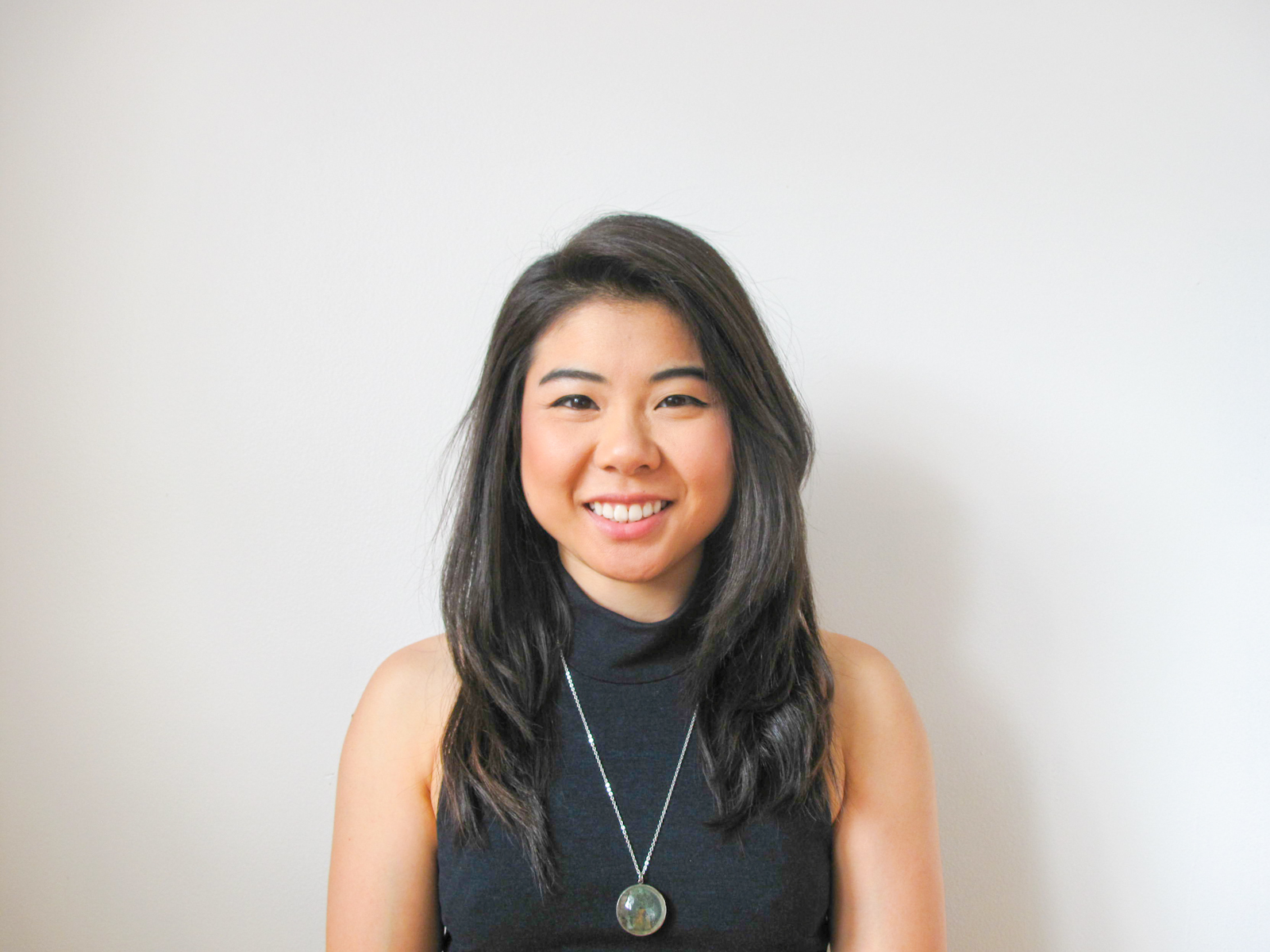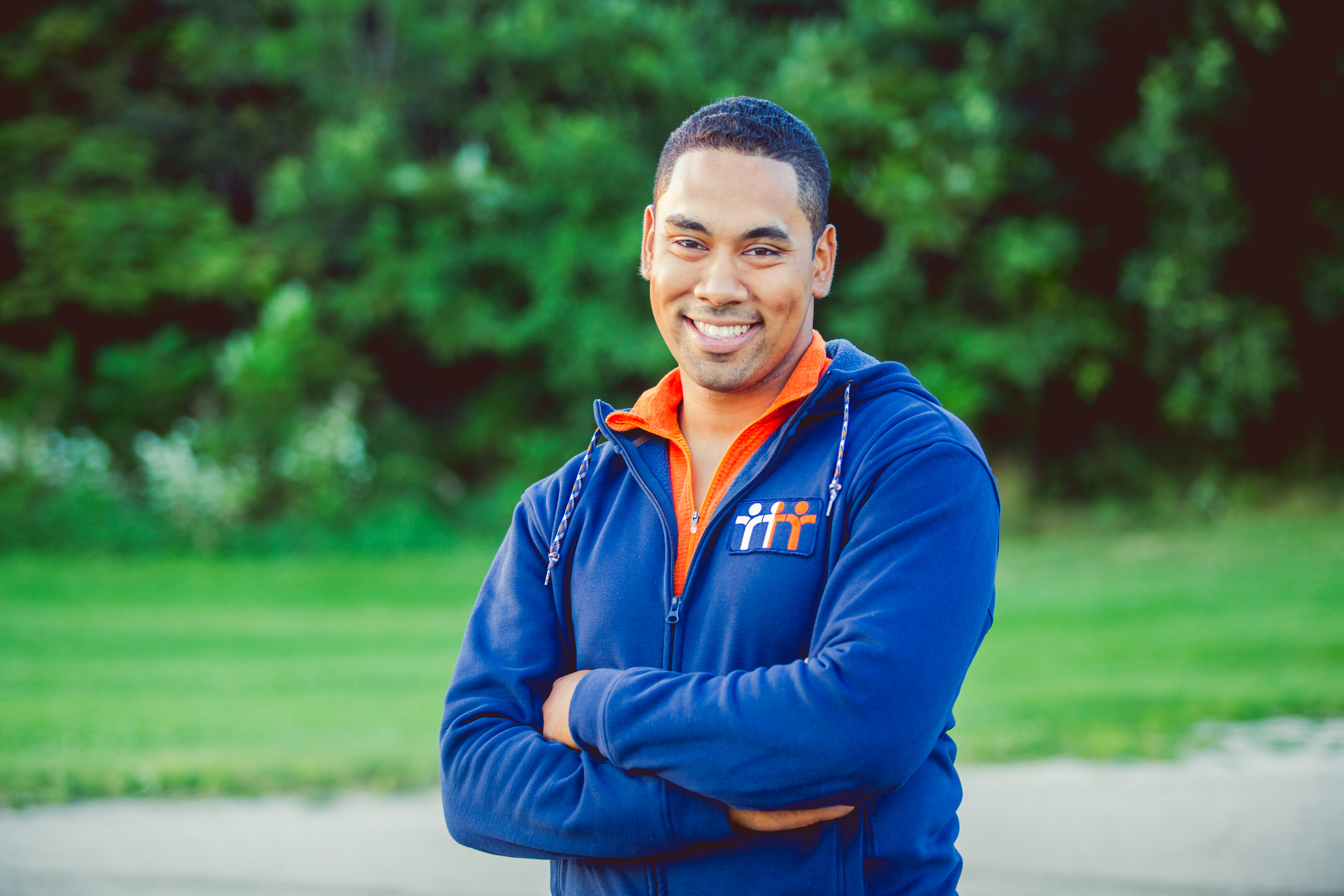February 25 marked the second installment of a new series of KINections Career Cafes focusing on women and Black, Indigenous and people of colour alumni. Gerome Manson, Li-Ann Yap and Marlon Teekah shared the road(s) they took from being students at BPHE/KPE to having successful careers in the academia, tech and health coaching industries.

Gerome Manson, bottom right, poses with fellow KPE graduates on convocation day (picture courtesy of Gerome Manson)
Gerome Manson was born in Trinidad and Tobago and moved to Canada with his family when he was eight years old to the west end of Toronto.
“I was very interested in sport as a child and teen, and became more interested in physical activity pedagogy for people with sensory deficits and disabilities after losing vision in my right eye due to an infection,” says Manson. “I enrolled in the Bachelor of Physical Health and Education (BPHE) at the University of Toronto with the objective of becoming a high school physical education teacher.”
Following his graduation, he decided to pursue a master’s degree at the renamed Faculty of Kinesiology and Physical Education (KPE) under the supervision of Associate Professor Luc Tremblay, followed by a PhD co-supervised by Tremblay.
“It took me some time to adjust to KPE coming from my high school in Toronto’s west end, but I had a very positive experience,” says Manson. “I have met many lifelong friends there throughout my years of undergrad and graduate study. The experience definitely helped prepare me for my future career.”
That career is working at the Queen’s University School of Kinesiology and Health Studies as an assistant professor and researcher in neuromechanics and motor control. But, he didn’t always plan it that way. On February 25, Manson got to share his career trajectory with KPE students at the inaugural KINections BIPOC Career Café, designed to connect Black, Indigenous and people of colour alumni with students interested in hearing about their experiences.
“It was important for me to be part of this discussion because I feel like I would have appreciated hearing that your path is not always straightforward,” says Manson. “Life can hit you in different ways and present many challenges, especially for BIPOC students. I would like students to take away the idea that you don’t always see an end, and it is okay to change your idea.”
Manson shared he originally wanted to be a physical education teacher. Then in second year he thought about either medical school or physical therapy, however this was short-lived. In third year, because of his placements, he strongly considered occupational and environmental health. His younger brother who was also in KPE took this route and loves his job at SickKids. In his master’s he thought about enrolling in nursing and becoming a research analyst. It wasn’t until he was in his Ph.D. program that he strongly committed to trying to be a professor.
“I had a lot of part time work while I was in undergraduate and graduate studies,” says Manson. “These jobs also helped prepare me in different ways for my career.”
He worked as an ambassador, tour guide and community animator at U of T. He also worked as a research assistant in two labs in KPE. Outside of the Faculty, he worked as a sales rep for Hewlett Packard and as a freelance scientific writing editor when he was abroad. He also worked as a meal delivery biker between finishing his PhD and moving to Houston, where he did a one year post-doctoral fellowship in neurosurgery at Houston Methodist Research Institute prior to getting the faculty position at Queen’s.
“In all of these jobs I learned valuable skills that help me now in my role as a professor and researcher,” he says.
He also volunteered with the Summer Mentorship Program at U of T, students for barrier free access and graduate orientation week events with the School of Graduate Studies.
“Although it was hard to justify volunteering over taking more work shifts sometimes, I found that these positions presented opportunities to learn from people I would like to work with or be one day such as deans, learning strategists and community leaders,” he says. “Volunteering also came with many underrated ad-hoc benefits like a locker, a parking spot/bike storage or a desk where I could study in my downtime.” 
Picture of Li-Ann Yap, who went from a student at KPE to technology sales rep at Microsoft (image courtesy of Li-Ann Yap)
Li-Ann Yap says she checked most of the boxes for barriers to sport participation. But seeing a chance rowing presentation in Grade 10 took her from leading a mostly sedentary lifestyle to waking up at 4:30 am six days a week to row on Lake Ontario. She spent the rest of high school playing catch up with her more athletic peers trying as many different sports as she could.
“I was keenly aware of the physical, mental and social benefits I reaped because of my experience with sport and decided to pursue a BPHE to learn more about how sport could be used as a medium to change lives,” she says. “I also wanted to break the systemic barriers I experienced to help others access and participate in sport.”
Yap says she only recently became aware of how her experience at the Faculty helped her succeed in her career.
“I had a very rough five-year undergraduate experience and was not a model student or social butterfly,” she says. “I almost flunked a number of courses in first and second year and it was only in third year, after a strong mentor and practicum, that I found my place. This taught me resilience.”
When she graduated from the program, she had acquired a breadth of knowledge that spanned across science, sociology, psychology, ethics and history, but she wasn’t sure how she would be able to apply it in the real world.
“Then I realized that having a wide range of skills and experiences can not only help me adapt to almost any situation, it can also widen my career options,” she says.
This adaptability came in particularly handy in her current job at Microsoft, where she works in technology sales supporting a variety of clients and organizations go through a digital transformation.
“I spent 10 years in the non-profit sector before pivoting to the business world,” says Yap, who moved to the US in 2017 to complete a Masters in Business Administration and an internship at the Bill & Melinda Gates Foundation. “10 years ago I would never have guessed that I’d be working in tech,” she says. “I hope my experience gets KPE folks to challenge their assumptions of what’s possible with a kin degree.”
Yap says it was important for her to participate in KINections BIPOC Career Café in order to serve as a role model for people considering entering an industry typically dominated by white males.
“I hope that my story resonates with the BIPOC folk in kinesiology and helps them feel less alone when they enter the workforce,” she says. “Your career path doesn’t need to be linear or clear cut or mapped out. An open mind and curiosity are far more important.”
A picture of MPK program graduate Marlon Teekah, a health coach with a social conscience (image courtesy of Marlon Teekah)
Marlon Teekah played football in high school, which led him to start exercising. Exercise helped him develop physically, but it also made him feel more confident and gave him something to do together with his dad.
“I knew that I wanted to use exercise as a way to help others, so I decided to study kinesiology in my undergrad,” he says.
Teekah went back to school at KPE for his Masters of Professional Kinesiology in 2016.
“I loved going back to KPE for my MPK degree,” he says. “I graduated from the BPHE program in 2009, so I had several years in between degrees to work and run my kin business.”
This time helped him to zero in on the gaps in his knowledge and the questions he wanted to answer, and it gave him a reason for going back to school.
“I knew why I wanted to be there, I knew what I wanted to learn and how it would help me afterwards,” he says. “For example, after I graduated from my bachelor's and started to run my health coaching business, I saw a major issue with health inequity in our field and how wealth determined health.”
Going back to school helped him explore some of the causes and focus on solutions.
“The MPK program really helped me, especially Professor Michael Atkinson's class on social inequality in health,” says Teekah.
He wrote his final capstone project about it and applied much of what he learned to his work.
During the COVID-19 pandemic he’s continued to see his clients online, helping them with rehab exercises after injuries, in partnership with a physiotherapist, and overall fitness and health.
From 2015 until 2020 when the pandemic hit, he taught a health and fitness class in the college vocational program at George Brown College. All the students were on the autism spectrum or had mild intellectual disabilities.
“I led 30+ students with a weekly exercise and sports activities, and also got the students to lead the class with me and teach their peers,” says Teekah.
He also partnered with KPE to have placement students work with him as assistant instructors.
“I’ve been involved on and off with KPE as a mentor in the placement program and/or guest speaker for KPE’s Career Cafes since 2014,” says Teekah. “I volunteer my time because I think it's important to give back to places that have given a lot to me. When I do so, I also continue to receive. It's like a muscle that keeps growing, a circle of reciprocity.”
Teekah says he is grateful for all the things he learned at KPE and felt it was important for him to share his experience with students tuning in to the BIPOC Career Café.
“I wanted to be involved in this panel because I have found my race, ethnicity and culture has influenced my perspective, values and the projects I choose to get involved in,” he says. “I wanted to share this with students who are interested.”
The KINections program is proudly sponsored by U of T affinity partner, Manulife.
